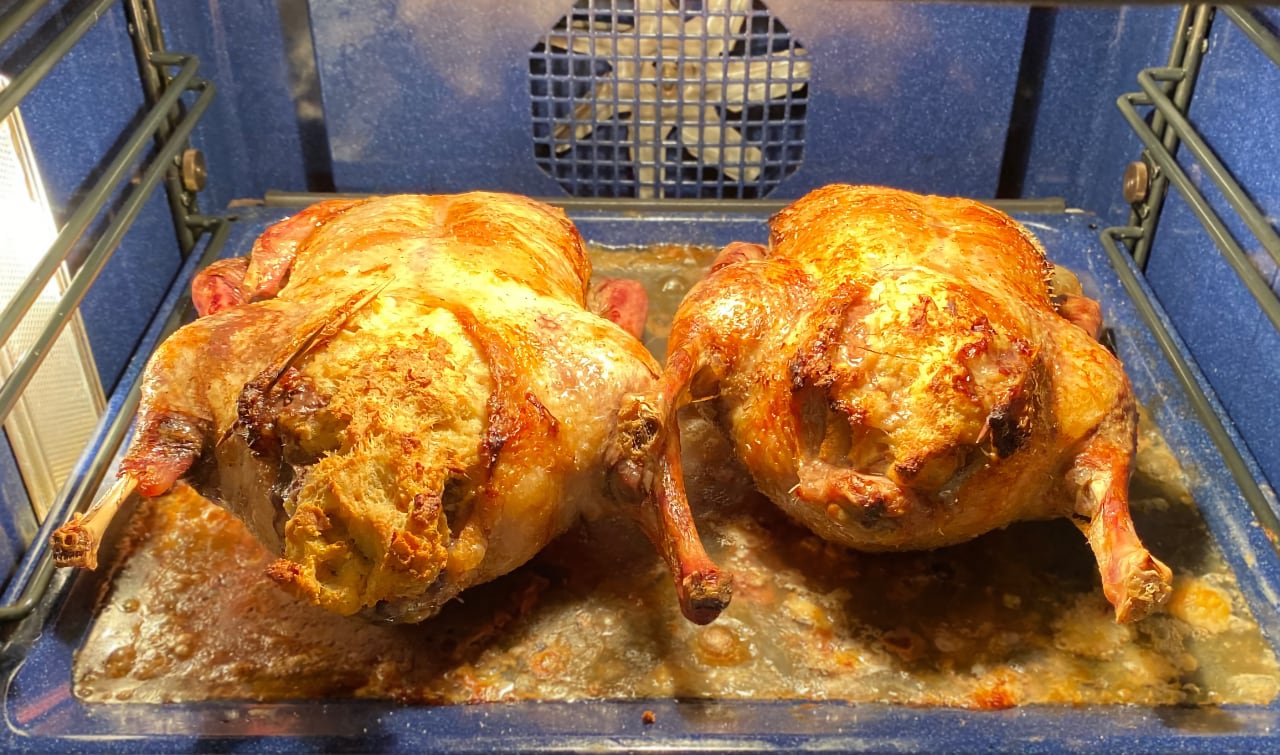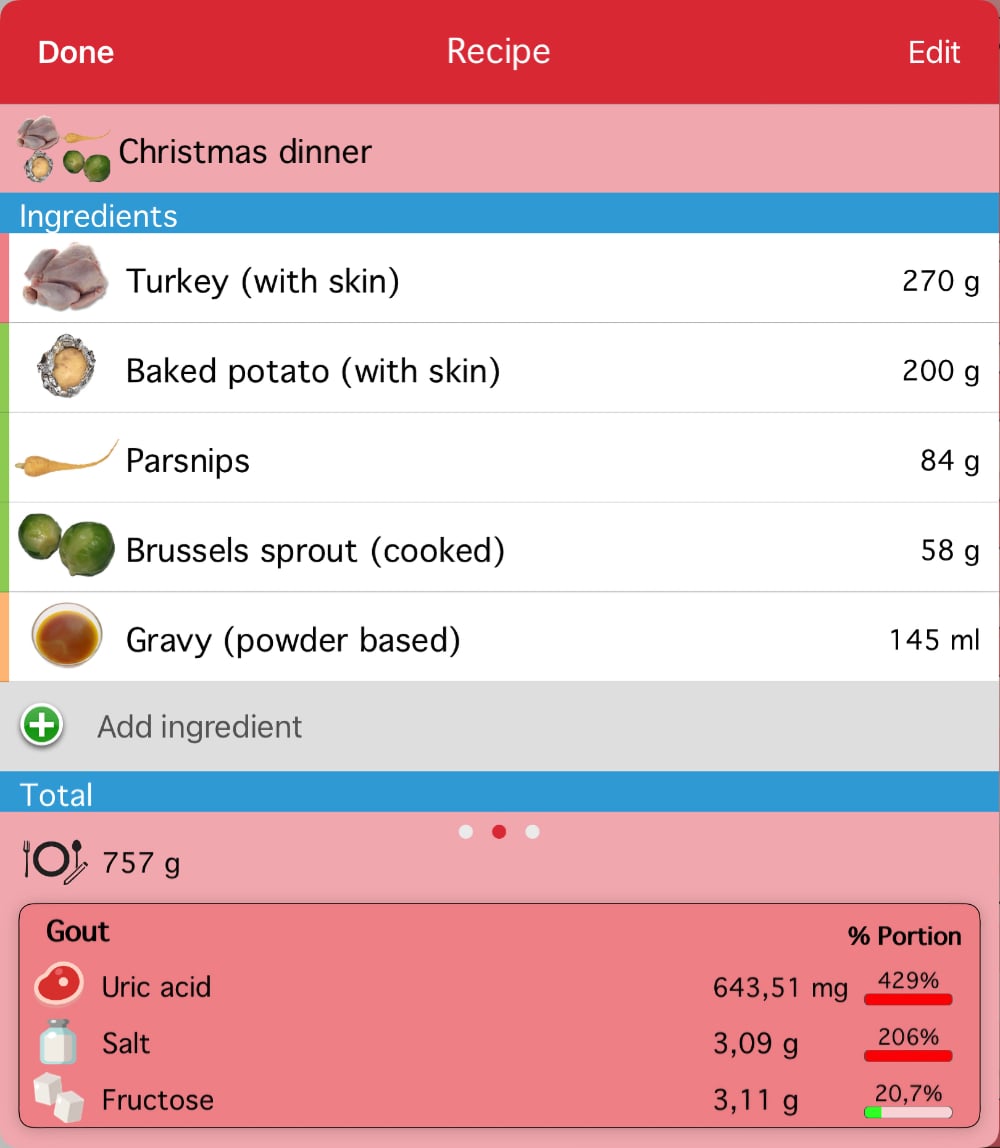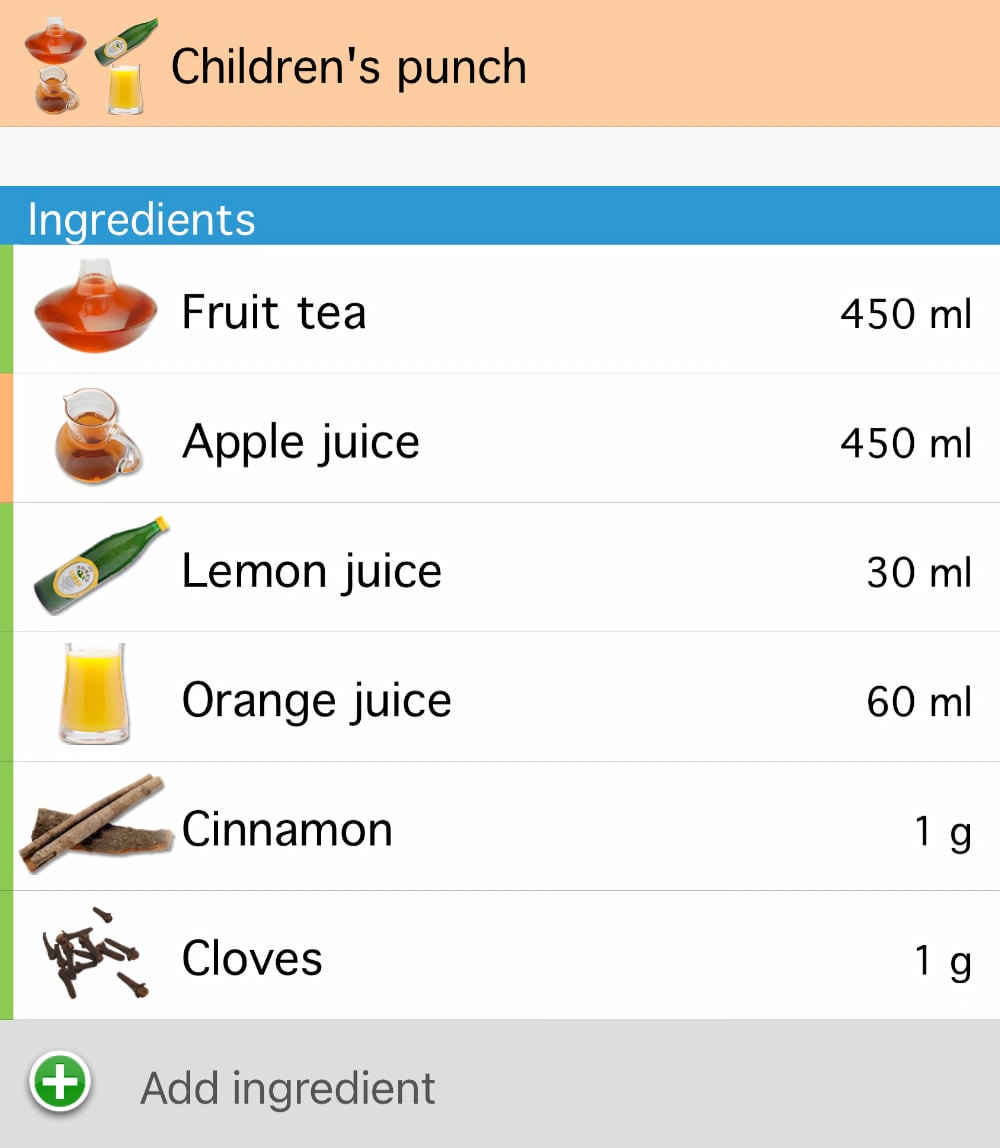Turkey and gout: how much purine is in your Christmas dinner?
12/18/2021 OxiPur
It’s that time of year again. Christmas is just around the corner and thoughts will be turning to spending quality time with the family and eating and drinking to hearty excess. But what might not be on your mind is the purine content of all that goes into your body over the festive period. Luckily, our OxiPur app’s purine calculator can work this out for you. We have taken a typical Christmas dinner and estimated how much purine you are likely to consume, also including a few helpful tips on what to look out for if you suffer from gout.

The highlight of the holiday season is usually the food, which traditionally is often a Christmas turkey. Eating in moderation is notoriously difficult at this time of year, however, especially with large gatherings of people. The more people around you, the more you eat. This is an automatic human behaviour, deeply ingrained in us and very difficult to resist. And at Christmas, the presence of all sorts of delicious food – cookies, pies, meat, vegetables, and alcohol – makes it doubly hard to exercise self-control.
For sufferers of gout, it is lavish meals like a Christmas dinner that can precipitate a flare-up. The combination of a large quantity of meat and alcohol puts heavy strain on the kidneys, which cannot keep up with the increased excretion of uric acid. With this in mind, it is a good idea to think beforehand about what you want to eat over Christmas, so that you might keep within the purine limit of 200 mg per meal. If this amount is well exceeded, it can lead to the formation and depositing of more uric acid crystals in the body.
Many people serve turkey at Christmas. Wherever you are in the world, this can come with a range of side dishes, such as potatoes (baked or mashed), stuffing and root vegetables. With the help of OxiPur we have put together an example of a typical Christmas dinner.
 ▲ Screenshot 1: purine content of a typical Christmas dinner with turkey, baked potatoes, Brussels sprouts and parsnips
▲ Screenshot 1: purine content of a typical Christmas dinner with turkey, baked potatoes, Brussels sprouts and parsnips
The above meal consists of a hearty portion of meat (two slices of turkey), a generous serving of potatoes, gravy and selected vegetables. The maximum recommended daily amount of purine is 500 mg, but as you can see above, one would well exceed that limit eating just this meal alone.
When it comes to reining in the purine we consume, there is unfortunately no alternative but to eat less, particularly when it comes to meat. The OxiPur app allows you to vary the ingredients and their quantities in order to determine which food servings are most suitable for you.
When preparing the gravy, for example, consider using natural ingredients that will help keep the purine (and salt) content down, instead of using instant gravy granules or powder, which are high in yeast extract and therefore rich in naturally occurring purines.
The combination of high-purine meals and alcohol is particularly dangerous because it hampers the excretion of uric acid over the long term, due of the strain put on the kidneys. So, if you are eating something high in purines, hold back on the alcohol! It is worth noting that alcohol-free alternatives do not always help in this regard. Unfortunately, there is no good substitute for simply making the sacrifice.
We should not forget that purines are only one side of the coin, the other being sugar. A traditional Christmas also involves sweet dishes such as pies, cookies and cake, and this also presents a problem. These foods may contain healthy ingredients like nuts, spices and citrus fruits, but they are usually so loaded with sugar that the bad outweighs the good. Even children’s punch will often contain more sugar than we think, despite no extra sugar being added during preparation (see screenshot 2).
 ▲ Screenshot 2: typical ingredients of children's punch
▲ Screenshot 2: typical ingredients of children's punch
If you eat sensibly and in moderation over a sustained period of time, then you have earned a break to enjoy a traditional Christmas dinner with all the trimmings. However, over-eating for several days on thick, heavy foods, drinking alcohol and consuming too much sugar in between can quickly negate the good progress made in the preceding weeks and months. At worst, it leads to a severe gout attack, so think twice before having seconds this holiday season.
Back to blog

The highlight of the holiday season is usually the food, which traditionally is often a Christmas turkey. Eating in moderation is notoriously difficult at this time of year, however, especially with large gatherings of people. The more people around you, the more you eat. This is an automatic human behaviour, deeply ingrained in us and very difficult to resist. And at Christmas, the presence of all sorts of delicious food – cookies, pies, meat, vegetables, and alcohol – makes it doubly hard to exercise self-control.
For sufferers of gout, it is lavish meals like a Christmas dinner that can precipitate a flare-up. The combination of a large quantity of meat and alcohol puts heavy strain on the kidneys, which cannot keep up with the increased excretion of uric acid. With this in mind, it is a good idea to think beforehand about what you want to eat over Christmas, so that you might keep within the purine limit of 200 mg per meal. If this amount is well exceeded, it can lead to the formation and depositing of more uric acid crystals in the body.
What is in a typical Christmas dinner?
Many people serve turkey at Christmas. Wherever you are in the world, this can come with a range of side dishes, such as potatoes (baked or mashed), stuffing and root vegetables. With the help of OxiPur we have put together an example of a typical Christmas dinner.

The above meal consists of a hearty portion of meat (two slices of turkey), a generous serving of potatoes, gravy and selected vegetables. The maximum recommended daily amount of purine is 500 mg, but as you can see above, one would well exceed that limit eating just this meal alone.
When it comes to reining in the purine we consume, there is unfortunately no alternative but to eat less, particularly when it comes to meat. The OxiPur app allows you to vary the ingredients and their quantities in order to determine which food servings are most suitable for you.
When preparing the gravy, for example, consider using natural ingredients that will help keep the purine (and salt) content down, instead of using instant gravy granules or powder, which are high in yeast extract and therefore rich in naturally occurring purines.
The combination of high-purine meals and alcohol is particularly dangerous because it hampers the excretion of uric acid over the long term, due of the strain put on the kidneys. So, if you are eating something high in purines, hold back on the alcohol! It is worth noting that alcohol-free alternatives do not always help in this regard. Unfortunately, there is no good substitute for simply making the sacrifice.
What about dessert?
We should not forget that purines are only one side of the coin, the other being sugar. A traditional Christmas also involves sweet dishes such as pies, cookies and cake, and this also presents a problem. These foods may contain healthy ingredients like nuts, spices and citrus fruits, but they are usually so loaded with sugar that the bad outweighs the good. Even children’s punch will often contain more sugar than we think, despite no extra sugar being added during preparation (see screenshot 2).

‘Tis the season of over-indulging
If you eat sensibly and in moderation over a sustained period of time, then you have earned a break to enjoy a traditional Christmas dinner with all the trimmings. However, over-eating for several days on thick, heavy foods, drinking alcohol and consuming too much sugar in between can quickly negate the good progress made in the preceding weeks and months. At worst, it leads to a severe gout attack, so think twice before having seconds this holiday season.
Why do we care so much about this topic?
 We have been developing our "OxiPur" app about gout and oxalates for many years and are happy to share our knowledge with you. Check it out:
We have been developing our "OxiPur" app about gout and oxalates for many years and are happy to share our knowledge with you. Check it out:
Share article
Share article
Back to blog
![[Blog]](../../rw_common/images/baliza_logo_retina.png)
